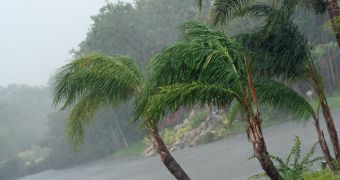A group of researchers at the Massachusetts Institute of Technology (MIT), in Cambridge, announces that global warming and climate change will adversely affect instances of extreme precipitation, further intensifying them by a significant margin.
These effects will be noticeable on thunderstorm complexes, flood-inducing monsoons and wide-sweeping cyclones, the investigators say. On average, a 1-degree Celsius increase in temperature will make precipitations 10 percent heavier.
Findings such as this are significant because they reveal a future where heavily populated areas will be affected by very severe floods, and potentially droughts in the dry season. Hundreds of millions of people around the world live in areas prone to experiencing such effects.
Climatologists have determined that global warming can intensify extreme precipitations long ago, but the exact extent to which this phenomenon will occur at the tropics has thus far remained subject to debate. The MIT study is the first to put some values in this equation.
Details of the investigation appear in this week's online issue of the top journal Nature Geoscience.
“The study includes some populous countries that are vulnerable to climate change, and impacts of changes in rainfall could be important there,” says MIT assistant professor Paul O’Gorman.
“It seems rainfall extremes in tropical regions are more sensitive to global warming. We have yet to understand the mechanism for this higher sensitivity,” adds the expert, who holds an appointment as the Victor P. Starr Career Development assistant professor of atmospheric science.
The expert and his team based their findings on satellite observations of extreme rainfall that occurred between the latitudes of 30 degrees north and 30 degrees south, over several years. These data are remarkably accurate, and provide a solid basis for analysis.
However, records only cover 20 years. “That’s not long enough to get a trend in extreme rainfall, but there are variations from year to year. Some years are warmer than others, and it’s known to rain more overall in those years,” O’Gorman concludes.
The findings suggest that it may be more economically feasible to take action against global warming now, rather than wait until it may be too late.

 14 DAY TRIAL //
14 DAY TRIAL //